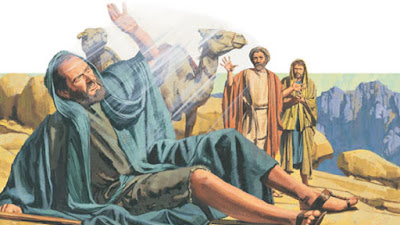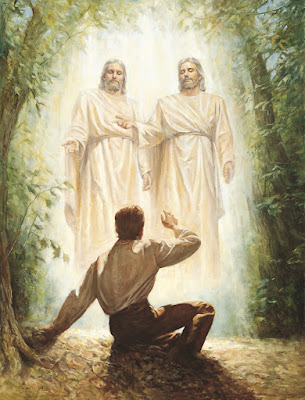Latter-day Application
Does this sound like anything we may be experiencing in these days? There are many who disagree with the teachings of the Church of Jesus Christ of Latter-day Saints. There are also many who not only disagree with, but also hate the Church. And then there are those who, like Saul, seek to destroy the Church - because simply agreeing to disagree isn't enough for them. They have been so deceived that they put forth great efforts to destroy what is the Lord's Church.
Do we ever seek to destroy the Church? By this I mean, are our actions and deeds ones that will work to build others up and bring them to Christ? Or are they ones that will tear others down?
The Road to Damascus
As we continue reading in Acts, we learn of a miraculous experience that Saul had as he headed on the road to Damascus. I find it interesting that he had this experience while he was on his way to hunt down those who had fled Jerusalem to escape his wrath.
The scriptures read:
 "And as he journeyed, he came near Damascus: and suddenly there shined round about him a light from heaven: And he fell to the earth, and heard a voice saying unto him, Saul, Saul, why persecutest thou me? And he said, Who art thou, Lord? And the Lord said, I am Jesus whom thou persecutest... And he trembling and astonished said, Lord, what wilt thou have me to do?" (Acts 9:3-6).
"And as he journeyed, he came near Damascus: and suddenly there shined round about him a light from heaven: And he fell to the earth, and heard a voice saying unto him, Saul, Saul, why persecutest thou me? And he said, Who art thou, Lord? And the Lord said, I am Jesus whom thou persecutest... And he trembling and astonished said, Lord, what wilt thou have me to do?" (Acts 9:3-6).Our Own Road to Damascus
In the April 2011 General Conference, President Dieter F. Uchtdorf gave a talk entitled "Waiting on the Road to Damascus" in which he addresses a problem that many individuals face in our day.
He said:
 "We know that manifestations such as [Christ appearing to Saul] happen. In fact, we testify that a similar divine experience happened in 1820 to a boy named Joseph Smith. It is our clear and certain testimony that the heavens are open again and that God speaks to His prophets and apostles. God hears and answers the prayers of His children.
"We know that manifestations such as [Christ appearing to Saul] happen. In fact, we testify that a similar divine experience happened in 1820 to a boy named Joseph Smith. It is our clear and certain testimony that the heavens are open again and that God speaks to His prophets and apostles. God hears and answers the prayers of His children.
"Nevertheless, there are some who feel that unless they have an experience similar to Saul's or Joseph Smith's, they cannot believe. They stand at the waters of baptism but do not enter. They wait at the threshold of testimony but cannot bring themselves to acknowledge the truth. Instead of taking small steps of faith on the path of discipleship, they want some dramatic event to compel them to believe.
"They spend their days waiting on the road to Damascus."
I don't know about anybody else, but I have never had such an experience as Saul or Joseph Smith did. I have never seen a heavenly messenger (and even if I had, I'm sure I would have probably been told not to share that experience with others) or heard a voice from heaven telling me exactly what I needed to do. So how can I possibly stand up in a fast and testimony meeting and say the words "I know that this church is true"?
President Uchtdorf speaks further on the subject:
"The truth is, those who diligently seek to learn of Christ eventually will come to know Him. They will personally receive a divine portrait of the Master, although it most often comes in the form of a puzzle - one piece at a time. Each individual piece may not be easily recognizable by itself; it may not be clear how it relates to the whole. Each piece helps us to see the big picture a little more clearly. Eventually, after enough pieces have been put together, we recognize the grand beauty of it all. Then, looking back on our experience, we see that the Savior had indeed come to be with us - not all at once but quietly, gently, almost unnoticed."
This is something that I can truly testify of. I cannot tell you the exact moment when I realized that I knew for a fact that the Church was true. Sure, I can tell you of experiences that helped shape my testimony of the Book of Mormon or of Joseph Smith being a prophet, but I cannot give you one isolated moment where I suddenly realized "Wow, it's all true!" Instead, things came to me as it is told they would be in the Book of Mormon when we are told that the Lord "will give unto the children of men line upon line, precept upon precept, here a little and there a little" (2 Nephi 28:30).
Move Forward Courageously
Something that particularly struck me about Saul's experience, was the what he asked of the Lord during this experience. Of all of the things that Saul could have asked, he chose to ask the Lord something that I think we all struggle to ask at times: "What wilt thou have me to do?" (Acts 9:6).
How often do we take the time to question this of the Lord? I hope that we do it daily, although I will admit that I am not so diligent.
President Uchtdorf's closing words speak of this and how we can keep ourselves from simply waiting on our road to Damascus. He says:
"Brothers and sisters, dear friends, let us not wait too long on our road to Damascus. Instead, let us courageously move forward in faith, hope, and charity, and we will be blessed with the light we are all seeking upon the path of true discipleship."
How beautiful is that promise? As we move forward courageously, we will have the light that we are seeking. To me, that's incredible.
Resources:
Dieter F. Uchtdorf. Waiting on the Road to Damascus. April 2011 General Conference of the Church of Jesus Christ of Latter-day Saints. Retrieved from https://www.lds.org/general-conference/2011/04/waiting-on-the-road-to-damascus.p30-31?lang=eng&_r=1

No comments:
Post a Comment